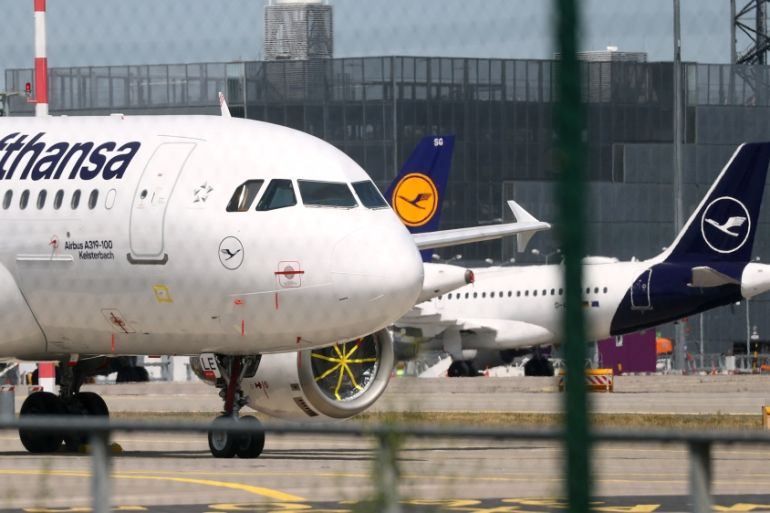German airline Lufthansa reports $2.3bn net loss in first quarter
Lufthansa announces ‘far-reaching’ restructuring plans despite $9.7bn bailout deal as it braces for further decline.

German airline Lufthansa has announced “a far-reaching” restructuring plan as it reported a net profit loss of 2.1 billion euros ($2.3bn) for the first quarter due to the coronavirus pandemic.
The company’s pledge to slash costs came on Wednesday despite reaching a nine-billion-euro ($9.7bn) bailout deal with the German government as it braces for a significant decline in 2020 earnings.
Keep reading
list of 3 itemsThousands at United Airlines could lose jobs in October: Report
Etihad told to restructure debt or face legal action, say sources
“Global air traffic has come to a virtual standstill in recent months. This has impacted our quarterly results to an unprecedented extent,” Carsten Spohr, Lufthansa’s chief executive, said in a statement.
“In view of the very slow recovery in demand, we must now take far-reaching restructuring measures to counteract this,” he said.
On top of the collapse in passenger numbers, depreciation of some company assets sapped the bottom line.
Falling fuel prices cost the airline 950 million euros ($1bn) because it had hedged its purchases with much higher priced contracts.
The first quarter was much worse than the loss of 342 million euros ($383m) booked in 2019’s first quarter – traditionally a quiet time for travel.
Bailout deal
The airline’s supervisory board on Monday approved a nine-billion-euro ($9.7bn) bailout deal from the German government.
The group is to ask its shareholders to back the accord at an online meeting on June 25.
The bailout will see the German government take a 20-percent stake in the group, with an option to claim a further 5 percent plus one share to block hostile takeovers.
That would make the federal government Lufthansa’s biggest shareholder.
Like its rivals, the Lufthansa group – which also includes Eurowings, Swiss, Brussels and Austrian Airlines – has been battered by the coronavirus pandemic.
The airline said on Wednesday it plans to increase seat capacity in September to “up to 40 percent” of what was expected before the pandemic, and compared with about 3 percent in May.
But of its 760 aircraft, 300 are expected to remain parked next year and 200 in 2022.
Even with the hoped-for gradual ramp-up of passenger traffic, Lufthansa’s push to repay the bailout cash “will only succeed if we implement restructuring programmes in all areas … and agree on innovative solutions with the unions and working councils”, Thorsten Dirks, Lufthansa’s finance director, said.
‘Significant decline’
Brussels is reducing its fleet by 30 percent and its workforce 25 percent, while Austrian will have 20 percent fewer planes and aims to cut personnel costs by the same amount.
Over the long term, the flagship airline may have 100 planes too many, giving an overhang of 10,000 jobs, Spohr said in May.
Other divisions at Lufthansa face similar cost-cutting programmes, while the company is in talks with aircraft builders to postpone deliveries of new planes and is eyeing sales of non-core business units.
Looking ahead, “the uncertain further development of the coronavirus pandemic continues to make it impossible to make a precise forecast of the earnings trend for 2020”, the group said, predicting only a “significant decline” in adjusted operating profit.